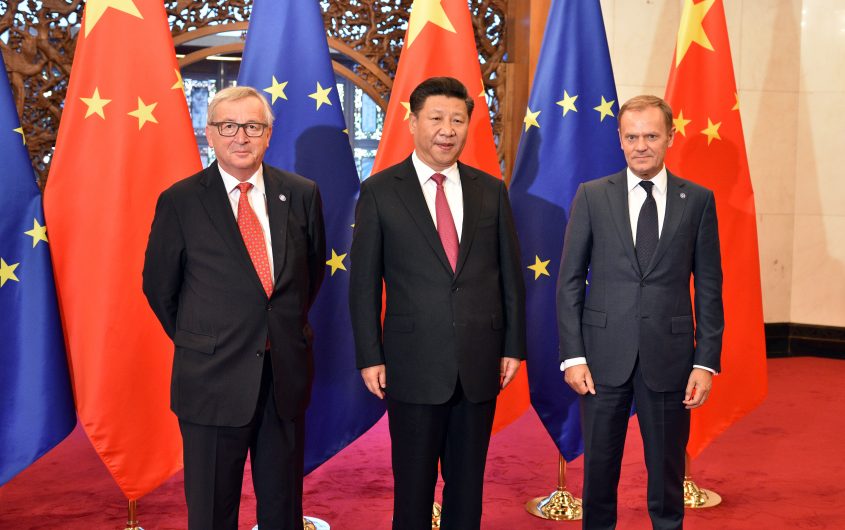
European External Action Service via Flickr
China as a Cause of Transatlantic Tension and Cooperation

Olivia Howard
Ms. Olivia Howard is a research intern at AICGS for the summer of 2022. She supports resident fellows with their research projects, manages databases, and helps to organize and document AICGS events.
Ms. Howard is currently completing her BA at Davidson College, with dual majors in Biology and German Studies. Within her study of the humanities, her research interests lie in cultural and societal topics, particularly concentrating on societal structures and the impact on marginalized communities.
Prior to working at AICGS, Ms. Howard conducted research with the Gideon Mendel Archive, where she was able to investigate materials involving memory culture and the German-Jewish diaspora. Ms. Howard has future plans to pursue a graduate degree within the field of biology.
From Tiananmen Square to the War in Ukraine
U.S. and European relations with China have been seldom smooth and harmonious. But rivalry and competition have also characterized the transatlantic allies’ very different approach of how to deal with China, not least in the political and economic sphere. China, of course, contributed to the resulting tension by doing its best to drive a wedge between the allies.
On April 28, 2023, Klaus Larres presented the result of his research project which analyzed the U.S. and European—in particular the German—approach to China from the Tiananmen massacre in 1989 and the end of the Cold War to the present war in Ukraine. During these years, China was a cause of both intense friction and, not least since recently, much transatlantic cooperation. But will this at present broadly cooperative transatlantic approach toward China become a long-lasting feature of transatlantic and in particular German-American relations?
Event Summary
From the 1990s to the present, there have been frequent and substantial shifts in transatlantic cooperation. In recent times, China has been working to gain a footing in European markets, especially Germany. The political and economic affairs of transatlantic trade are considered in this discussion through the interaction of Europe, China, and the Biden administration.
Emerging relationship between Europe and China:
- The European Union (EU) and Germany do not view themselves as hegemons or competitors for global power, so their relations with China are less adversarial than U.S. relations with China.
- China wants to develop connections in Europe and shift Germany away from the United States. Beijing often sees their potential influence in Europe under a misreading of their beliefs on the current state of Europe:
- That divisions between countries in the EU (countries with more power versus countries with little power) will continue to increase,
- The EU will eventually seek autonomy as it grows tired of the United States viewing European countries as underlings, and
- There is chaos currently between the world’s democracies, making it a good time to seek influence and connections.
Interest in Germany:
- Germany is a core country within the EU and has strong economic power and influence. The country has lucrative manufacturing, technology, and engineering sectors to sustain its economy. The economy is also sustained by cheap materials that make it easier for the country to dominate on the world stage and an increasing Chinese market for German goods.
- Germany and the EU have been passive with their policies towards China, and it is expected with the election of Chancellor Olaf Scholz, Germany will continue this trend. Germany’s export market is dependent on Chinese consumers and will not want to endanger this relationship.
The War in Ukraine:
- During the war in Ukraine, China has faced international backlash as it supports Russia. Due to China’s dependency on Russia as a global partner and its need of Russian raw materials, this support is not surprising.
- Although China has been met with criticism from the EU and United States concerning Ukraine, China does not believe that its support for Russia will ultimately have negative effects on its trading relationships with Germany and the EU.
Western Disenchantment with China:
- In the past ten to fifteen years, disputes between countries relating to international trade relationships have become more intense. This links back to the Great Recession and how it impacted the world markets, as well as Xi Jinping’s rise to power and his attempt to break alliances between the EU and the United States.
- After 2001, many countries were surprised to see China rise in world influence. After it joined the WTO, China was able to gain influence and power through unfair and uncompetitive strategies. Despite the surprise, many of the interactions with China were positive from the 1970s until recently, as China’s open market proved lucrative for many countries.
- The Obama administration’s ‘pivot to Asia’ did not bring any real change to the trade relationship with China. In a way, the relationship was neglected as the United States and the world dealt with the economic crisis. 2015-16 proved to be pivotal years in the world’s relationship with China, especially after the government released the Industrial Plan of China for 2025. Within this plan, it was discovered that China planned to imitate Germany’s industry and grow to become a world leader in technology.
- Since Germany’s economy depends on being a leader in technology, this plan became a concern. China also began investing in western high-tech companies, which made this plan more obtainable. During the Trump administration, U.S. relations with China turned for the worse, and the EU saw a similar trend. Due to economic reasons, the EU and American policies began to overlap in regard to China, especially after the EU named China a systemic rival. In 2020, the EU placed a hold on its investment treaty with China.
- Despite changing relationships, the EU still wants to avoid confrontation with China and will maintain a “sitting on the fence” attitude. Since China is the third largest global market for German goods, Germany will most likely continue to have a conciliatory approach toward Beijing.
Biden Administration:
- The United States’ transatlantic relations have improved, despite the chaotic withdrawal from Afghanistan and the signing of the AUKUS deal. Now is the time to continue developing transatlantic relationships on a positive level. There is a need to create an organizational setup that will institutionalize coordination with China.
The Future and Potential Solutions:
- The current transatlantic alignment toward China is unlikely to last.
- Midterm elections and the potential return of Trump will have a large influence on United States’ transatlantic relationships. There is the potential return of American isolationism, aloofness from NATO, coolness toward allies, and more.
- The United States can get more involved with transatlantic policies and help mend relations by reviving treaties that were killed during the Trump administration such as the Trans-Pacific Partnership. The United States should also consider joining agreements such as the amended Comprehensive and Progressive Agreement for Trans-Pacific Partnership (CPTPP) of 2018 and the Regional Economic Partnership, both of which China has an interest in. This will help the United States engage with more countries on a positive level, rather than alienating markets and adding to increased tensions.









